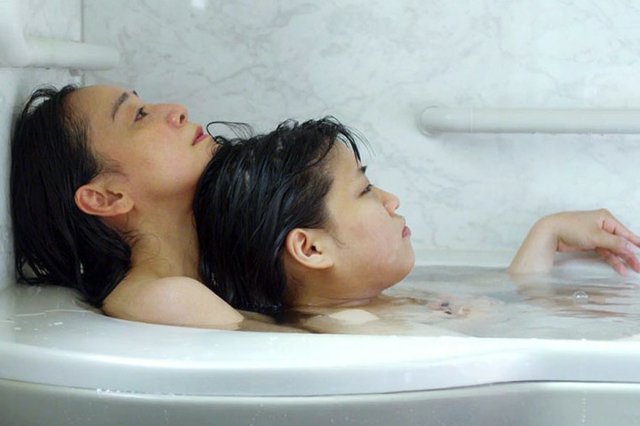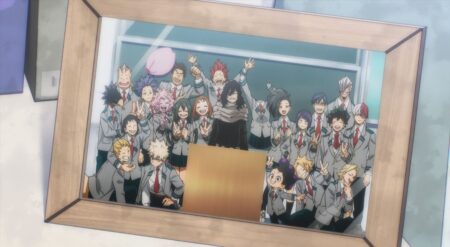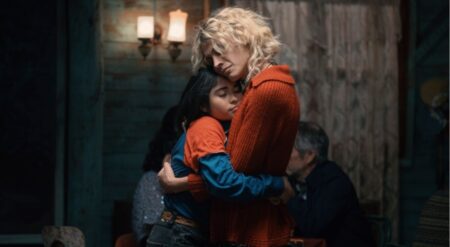
“We are more than our disability” could be the logline for writer and director Hikari’s first feature film 37 Seconds, which premiered in the Contemporary World Cinema Programme at this year’s Toronto International Film Festival (TIFF). From the very beginning of 37 Seconds, Hikari gives audiences a very personal, vulnerable, and intimate view of her lead character Yuma Takada, and by extension actress Mei Kayama. Audiences are placed at eye level with Yuma in a crowded train, seeing the world from her perspective, which at times felt almost overwhelming as she’s constantly careful to avoid being hit by the bags of careless travelers. When Yuma makes it home, she and her mother, Kyoko (Misuzu Kanno), discuss Yuma’s day and journey home from work.
As they go through the routine of taking off their shoes, and Yuma switching wheelchairs, Kyoko decides they should have a bath to cool off. What starts out as a seemingly mundane task, becomes one of the most intimate and necessary scenes I’ve seen in a while. With the camera placed low to the floor at a slight upward tilt, we watch Kyoko undress Yuma. Rather than the camera panning away, and the scene changing, it stays focused on Yuma as more and more of her body is revealed until she is completely naked.
Having Cerebral Palsy means that Yuma’s body looks different from those who don’t. Her spine is curved, her legs and arms shaped differently and smaller due to muscle atrophy. With this scene, Hikari (and Mei) commands the audience’s attention, and demands they see the beauty of the human body in all its various shapes. In an almost all-white bathroom, Yuma’s body stands out and becomes the focal point. To be blunt, for some people who don’t have a disability, looking at those who do is uncomfortable, and they either find it difficult to look disabled people in the eye or they look away completely. There are many reasons for this, from a misplaced sense of guilt, fear of staring, or not being around them on a regular basis. Saying this may be considered a faux pas, but if you look around and watch how people interact with disabled people, especially those in wheelchairs or use assisted walking devices…you’ll see it’s true.
In Hollywood – and the international movie industry – nudity has become the norm, but what has not been normalized is seeing the naked bodies of disabled characters and even less so, those of disabled actors playing these characters. We need to see them in seductive moody lighting and in bright sunlight. We need to see them because that is part of who they are and not just hear stories of their emotional struggles. They are sexual beings and deserve to be portrayed as such.
As a Mangaka i.e. manga artist, Yuma sees the world as a canvas and lives the adventures she wants to experience through her art. She has the skill to be successful but lacks the confidence to branch out on her own. Realizing that her friend and business partner Sayaka (Minori Hagiwara) is being dishonest, and even ashamed to be seen with her, Yuma decides to finally branch out on her own and pitches her art to the editor of a publishing house, specializing in adult manga. The female editor is interested in Yuma’s work, but very plainly tells her to have sex in order to give emotional depth and sexiness to the love scenes. Rather than becoming offended, Yuma takes the advice to heart and uses it as the inspiration to move away from the overprotective wing of her mother, to see what life has to offer her.
Watching Yuma discover the world in a whole new way is one of the many things that makes 37 Seconds special. In her quest to embrace her sexuality we see her find out who she is as a person and form new connections with people. In a world where disability is seen as something negative, Yuma finds a new family of individuals who accept her as she is and encourages her to go after her dreams.
When she learns a secret that could potentially destroy her relationship with her mother, they offer her the support necessary to deal with it. As her daughter goes on her own path, Kyoko comes to terms with a painful secret and the reality that Yuma is no longer a little girl who needs everything done for her. If she wants to keep her daughter close, the best thing she can do for both of them is to let her go, so they can both discover who they are.
With shots framed in such a way that almost every scene featured Yuma, be it close-ups of the various expressions moving across her face, or seeing her in silhouette, we’re reminded that this is about a 23-year-old young artist discovering that she can be who she wants to be. When it comes to portraying characters with disabilities, it’s all too easy to make the story solely about their disability and the struggles associated with it, and yes the film does show how difficult it can be for Yuma to navigate a society that doesn’t necessarily see accessibility as a priority, but it’s done in a way that doesn’t make that the sole focus of the film.
For her first acting role Mei Kayama is graciously honest in her demeanor and presence and has a bright future in the industry. During the interview with Hikari, she revealed that filming was done chronologically, and as Yuma, came into her own, so did Mei in a sense. Over the course of the film, there’s a maturity that develops and it’s wonderful to see. As Yuma goes on to fulfill her dreams, I wish the same for Mei, and for anyone who sees 37 Seconds to look beyond perceived limitations of disabilities and see the individual.
About Hikari
 Originally from Osaka, Japan, HIKARI is an award-winning writer, director, and producer. Her directorial debut short film Tsuyako (Drama, 2011, USC Thesis Film) visited over 100 film festivals worldwide receiving over 50 awards including Director’ s Guild of America Student Award for the Best Female Filmmaker. In 2013, she wrote and directed a live action & animated short film A Better Tomorrow (Fantasy Adventure, 2013) for the First Annual Lexus Short Films which was produced by The Weinstein Company.
Originally from Osaka, Japan, HIKARI is an award-winning writer, director, and producer. Her directorial debut short film Tsuyako (Drama, 2011, USC Thesis Film) visited over 100 film festivals worldwide receiving over 50 awards including Director’ s Guild of America Student Award for the Best Female Filmmaker. In 2013, she wrote and directed a live action & animated short film A Better Tomorrow (Fantasy Adventure, 2013) for the First Annual Lexus Short Films which was produced by The Weinstein Company.
Her other directing credit include a dance short film Where We Begin (Drama, 2015, Tribeca Film Festival), Can & Sulochan (Comedy, 2014, UULA) and Subaru’ s Dramatic Cinema Series – commercials and short films that features Subaru’ s vintage to latest models. With the script of 37 Seconds, she had participated in Sundance Institute/NHK Screenwriting workshop, Film Independent’s Screenwriting and Directing Lab in 2017. The film was completed in January 2019 and celebrating its world premiere at 2019 Berlin International Film Festival in their Panorama section. The film is also nominated for GWFF Best First Feature Film Award.
Header image courtesy of TIFF






